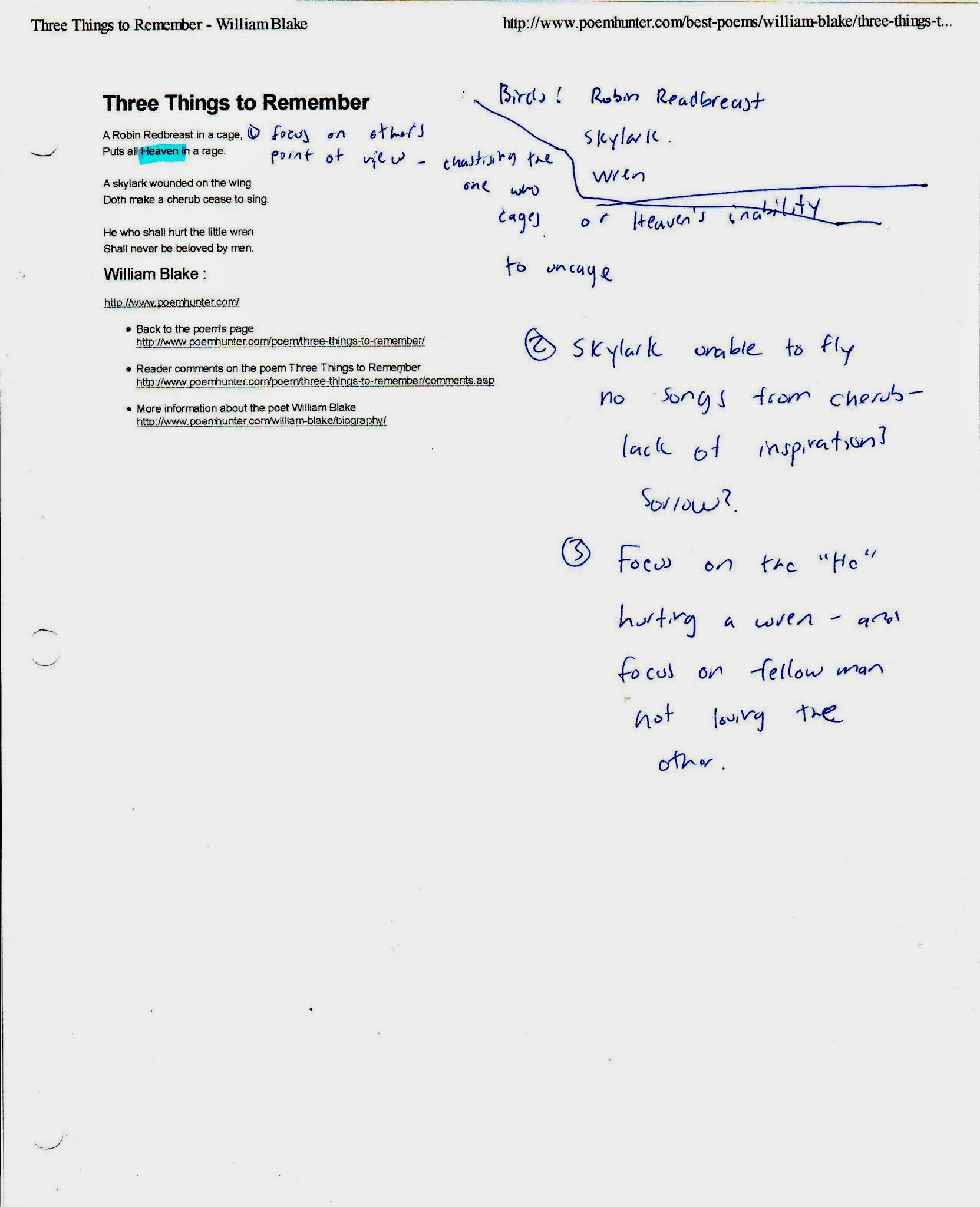Original poem reprinted online here: "Three Things to Remember" by William Blake
Originally read: November 5, 2013
More information about the Poet: William Blake
The conceit with this poem is in the title, "Three Things to Remember." So there's already a didactic effect going on here. However, each couplet goes with a similar formula -- bird / effect.
"A Robin Redbreasted in a cage / Puts all Heaven in a rage." Here the speaker automatically takes a prophetic stance and can tell the reaction of the divine. Keeping a Robin Redbreasted in a cage, puts Heaven in a rage -- yet it's sort of an impotent Heaven. Yes, there's rage, but what is the action from the divine.
Furthermore, the Robin Redbreasted could be an allusion to the nursery rhyme "Little Robin Redbreast" which adds a sense of metapoetics to the poem -- don't try to cage a poem like a bird.
"He who shall hurt the little wren / Shall never beloved by men"
I want to see the literary allusion to little wren, but I don't know what it would allude to. A cursory Google search leads to Wordsworth, "A Wren's Nest" which is actually plausible. As I'm reading that poem, I notice a lot of observation and care for young, and also the wren is referred to as a woman. So, this could be an metaphor on top of a metaphor.
"If a man hurts a little wren [woman, poem] / Shall never beloved [respect, cared for] by men."
Note the lack of divine and reference to men. The immediacy of disgust is there. Not only is the divine going to be upset, and not be able to sing, but men would be disgusted.
Now here's the question I have at the end of this. Is the speaker attacking those who use the images of birds in their poems, or defending them against those who don't understand the usage of the images? Maybe it could be both -- but it's such contrasting readings.
Originally read: November 5, 2013
More information about the Poet: William Blake
The conceit with this poem is in the title, "Three Things to Remember." So there's already a didactic effect going on here. However, each couplet goes with a similar formula -- bird / effect.
"A Robin Redbreasted in a cage / Puts all Heaven in a rage." Here the speaker automatically takes a prophetic stance and can tell the reaction of the divine. Keeping a Robin Redbreasted in a cage, puts Heaven in a rage -- yet it's sort of an impotent Heaven. Yes, there's rage, but what is the action from the divine.
Furthermore, the Robin Redbreasted could be an allusion to the nursery rhyme "Little Robin Redbreast" which adds a sense of metapoetics to the poem -- don't try to cage a poem like a bird.
"A skylark wounded on the wing / Doth make a cherub cease to sing" By itself, the theme of injuring or caging animals lead to a divine disgust. Action is taken, the cherub doesn't sing.
However, the allusion to the famous poem "To A Skylark" by Percy Shelley where, at the end of that poem, the Skylark sings and flies higher. Now with this poem, the skylark is wounded and parallels a cherub -- both cease to sing (if the allusion stands).
"He who shall hurt the little wren / Shall never beloved by men"
I want to see the literary allusion to little wren, but I don't know what it would allude to. A cursory Google search leads to Wordsworth, "A Wren's Nest" which is actually plausible. As I'm reading that poem, I notice a lot of observation and care for young, and also the wren is referred to as a woman. So, this could be an metaphor on top of a metaphor.
"If a man hurts a little wren [woman, poem] / Shall never beloved [respect, cared for] by men."
Note the lack of divine and reference to men. The immediacy of disgust is there. Not only is the divine going to be upset, and not be able to sing, but men would be disgusted.
Now here's the question I have at the end of this. Is the speaker attacking those who use the images of birds in their poems, or defending them against those who don't understand the usage of the images? Maybe it could be both -- but it's such contrasting readings.

)
Comments
Post a Comment